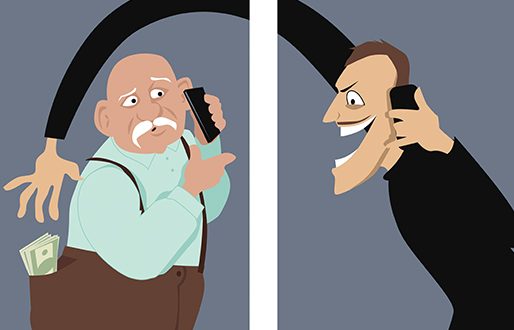Recently, a resident of Grinnell’s Mayflower Community received a phone call from a party identified on her caller ID as another resident. Happy to hear from this party, the resident answered the phone with a cheerful greeting.
As it turned out, not only was it not the other resident, it was a telephone solicitor (nicer term than “scammer.”). When asked to explain what was happening, the caller rebuffed the resident’s questions and launched into his scheme.
There are two warnings here. First, telephone solicitors can pick up any phone number, usually a local one, for display on caller ID. Second, since the start of the pandemic, the number of scam calls has increased significantly.
The following information is provided by the website, Security Boulevard.
In the last seven months, the Federal Trade Commission (FTC) has received over 175,000 consumer reports related to Covid-19 scams, totaling a whopping $118.81 million in losses.
So far, the top fraud reports relate to:
- Online shopping – 26,792 reports
- Travel and vacations – 21,674 reports
- Credit cards – 6,063 reports
- Banks, savings & loans, and credit card unions – 4,717 reports
- Healthcare – 4,109 reports
The #1 type of fraud, online shopping, resulted in $16 million in losses, according to the latest report. However, COVID-19 complaints related to fraud, identity theft, Do Not Call, and other consumer protection problems were also noted as a troubling trend.
“These are scams that trick people into ordering products like masks, hand sanitizer, and other high-demand items that never arrive,” the FTC said. “People are also reporting scam text messages related to bogus offers to earn income, phony economic relief programs, fake charities, and government imposters.”
The consumer protection agency also expects an uptick in phone scams leveraging the pandemic and government economic stimulus packages, as imposters seek personal and financial information.
Although the median loss fell from a reported $570 in April to $290, the number of submitted complaints has increased sharply, suggesting scammers are becoming more successful.
It’s critical to stay ahead of scammers and pay attention to red flags pointing to fraud. The FTC advises online shoppers to do some homework before ordering products online, paying attention to the company website and products.
Whatever you do, don’t provide personal or financial information via phone, email, and text messages, even if the person who contacts you claims to be a government or financial institution.
If you suspect you have been scammed, inform local authorities and contact your bank to dispute the charges. Brush up on spotting online shopping scams, and install a local security solution to ward off threats and protect your personal data from cybercriminals.
– Bob Mann, Sales & Marketing Director

